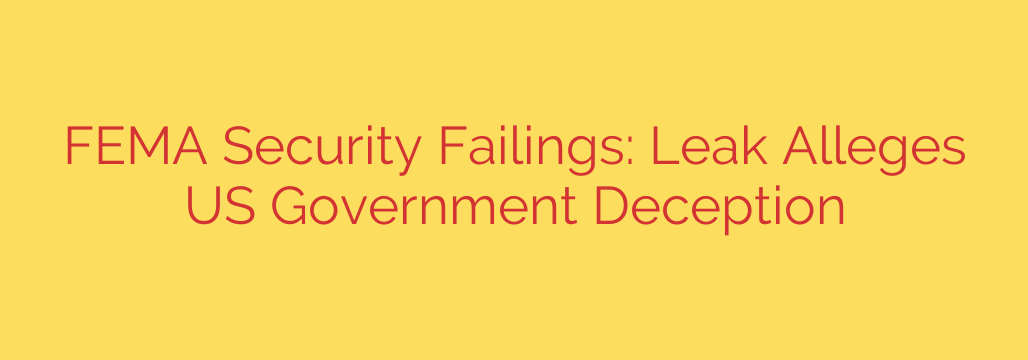
FEMA’s Data Security Crisis: Shocking Report Alleges Major Breach and Government Deception
In the wake of a natural disaster, Americans turn to the Federal Emergency Management Agency (FEMA) for help during their most vulnerable moments. A troubling new report, however, suggests that the very agency entrusted with their recovery may have exposed them to a different kind of disaster: a catastrophic failure of data security, potentially followed by a deliberate effort to conceal the true scale of the problem.
Recent leaks have brought to light serious allegations of a massive data breach within FEMA, compromising the sensitive personal information of countless disaster survivors. This incident raises urgent questions about the U.S. government’s ability to protect citizen data and its transparency when critical failures occur.
The Scope of the Security Failure
At the heart of the issue is the exposure of highly sensitive Personally Identifiable Information (PII). When individuals apply for federal disaster assistance, they provide a wealth of private data, including:
- Full Names and Addresses
- Social Security Numbers
- Banking and Electronic Funds Transfer Information
- Dates of Birth
According to the allegations, inadequate security protocols and systemic vulnerabilities left this data dangerously exposed. The report suggests that this was not a sophisticated external attack but a preventable internal failure, making the breach all the more concerning. This lapse potentially put millions of disaster victims at severe risk of identity theft and financial fraud.
Allegations of a Cover-Up
Perhaps more disturbing than the breach itself are the claims of deception. The leaked information contends that officials may have knowingly downplayed the severity of the security lapse when briefing lawmakers and the public. This raises critical concerns about government accountability and transparency.
If these allegations are true, it means that while vulnerable citizens were unaware their data was at risk, the agency responsible may have been more focused on managing public perception than on mitigating the damage. A failure to provide timely and accurate notification is a profound breach of public trust, leaving victims unable to take proactive steps to protect themselves.
The Human Cost: Vulnerable People at Greater Risk
It is crucial to remember who is affected by this failure. These are not just data points; they are families who have lost their homes to hurricanes, wildfires, and floods. They are individuals already facing immense stress and financial hardship.
Exposing them to the threat of identity theft adds an unimaginable burden to their recovery. Scammers and malicious actors actively target disaster survivors, and a breach of this magnitude provides them with a treasure trove of information to exploit. The consequences can include drained bank accounts, fraudulent loans taken out in their names, and years spent trying to repair their financial and personal reputations.
Actionable Steps to Protect Your Information
While the full details of this alleged breach are still emerging, it serves as a stark reminder that we must all be vigilant about our personal data, especially when dealing with large institutions. If you have ever applied for federal aid, it is wise to take precautionary measures.
1. Monitor Your Financial Accounts: Regularly check your bank and credit card statements for any unusual or unauthorized activity. Set up transaction alerts with your financial institutions.
2. Check Your Credit Reports: You are entitled to free credit reports from all three major bureaus (Equifax, Experian, and TransUnion) at AnnualCreditReport.com. Review them carefully for any accounts or inquiries you don’t recognize.
3. Consider a Credit Freeze: Freezing your credit is one of the most effective ways to prevent identity theft. A freeze restricts access to your credit report, making it difficult for fraudsters to open new accounts in your name. This is a free service offered by all three credit bureaus.
4. Be Wary of Phishing Scams: Be on high alert for emails, texts, or phone calls claiming to be from FEMA or other government agencies. Never click on suspicious links or provide personal information in response to an unsolicited request. Government agencies will typically not ask for sensitive data via email.
This situation underscores a critical need for robust cybersecurity protocols and unwavering transparency across all government agencies. Protecting the data of the American people, especially the most vulnerable among them, is not an optional priority—it is a fundamental responsibility.
Source: https://go.theregister.com/feed/www.theregister.com/2025/10/06/infosec_in_brief/








